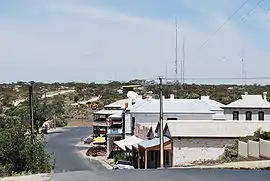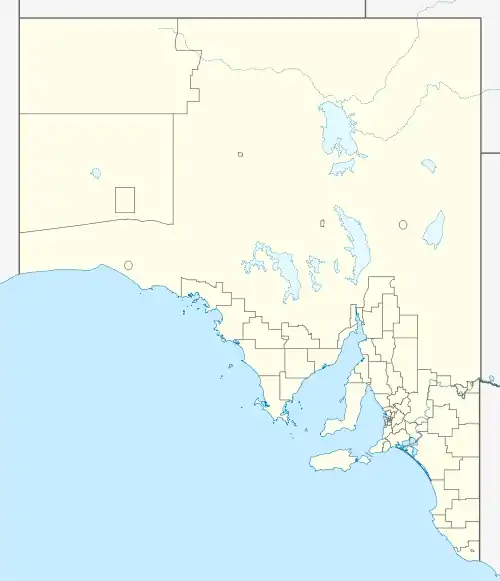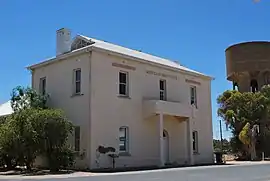Morgan, South Australia
Morgan is a town in South Australia on the right bank of the Murray River, just downstream of where it turns from flowing roughly westwards to roughly southwards. It is about 161 kilometres (100 mi) north east of Adelaide, and about 315 kilometres (196 mi) upstream of the Murray Mouth. At the 2006 census, Morgan had a population of 426.[2]
| Morgan South Australia | |||||||||||||||
|---|---|---|---|---|---|---|---|---|---|---|---|---|---|---|---|
 | |||||||||||||||
 Morgan | |||||||||||||||
| Coordinates | 34°02′0″S 139°40′0″E[1] | ||||||||||||||
| Population | 426 (2006 census)[2] | ||||||||||||||
| Established | 25 April 1878 (town) 27 March 2003 (locality)[3][4] | ||||||||||||||
| Postcode(s) | 5320 | ||||||||||||||
| Location | |||||||||||||||
| LGA(s) | Mid Murray Council | ||||||||||||||
| State electorate(s) | Chaffey[5] | ||||||||||||||
| Federal Division(s) | Barker[6] | ||||||||||||||
| |||||||||||||||
| Footnotes | Adjoining localities[1] | ||||||||||||||
History
Several Indigenous names are recorded: Korkoranna for Morgan itself, Koolpoola for the opposite flats, and Coerabko ('Katarapko'), meaning meeting place, for the bend locality.[7] Morgan is in the traditional lands of the Ngaiawang people.[8] Nganguruku people moved to the Morgan area when they lost access to their traditional lands further south.[9]
The first Europeans to visit were the expedition of Charles Sturt, who passed by in a rowboat in 1830. The first Europeans to visit overland, by horseback, in March 1838, was the expedition of Hill, Oakden, Willis, and Wood.[10] They noted a large Indigenous population. The locality was originally known to Europeans as the North West Bend, or Nor'west Bend, or Great South Bend, due to an acute change in the trend and direction of the Murray. The westward flowing stream of the river turns here to flow southward. The nearby pioneering pastoral station, Northwest Bend Station, established in the 1840s, still bears that name.
The town was proclaimed in 1878, the year the railway line from Adelaide via Kapunda was opened, and was named at that time after Sir William Morgan, then Chief Secretary, later Premier of South Australia. A large wharf was built, and Morgan, being the railway terminus (hence the name of a local hotel), became one of the busiest ports on the Murray. It handled nearly all the goods that were being imported and exported (particularly wool) to and from a vast region upstream from Morgan along the Murray and Darling rivers. At its peak, Morgan was the second busiest port in South Australia (behind only Port Adelaide), with six trains a day carrying freight from the Murray to the sea at Port Adelaide. As road transport improved through the early part of the 20th century, river transport declined. The railway to Morgan finally closed in 1969.
Heritage listings
Morgan has a number of heritage-listed buildings, including:
Modern Morgan
Morgan today is well known for its number of houseboat moorings and services, and a houseboat marina is currently under construction. A free road transport ferry service operates 24 hours for river crossings. Just southward (downstream) from Morgan is a riverfront development named Brenda Park, which has flourished since WWII, originally as rustic shacks, but now as prestige waterfront holiday homes.
Despite these new developments, many historic buildings remain in the town. A number of these buildings have signs showing their former use and appearance. The two hotels, both historic, sit opposite each other, facing the riverfront. A caravan park is sited near the riverfront. Morgan is in the Mid Murray Council local government area, the state electoral district of Stuart, and the federal Division of Barker.
During World War II, the Morgan-Whyalla pipeline was built from the Murray River at Morgan to supply fresh water to the city of Whyalla.
Gallery
 Uniting Church
Uniting Church Post Office
Post Office Museum
Museum
 War Memorial
War Memorial Lutheran Church
Lutheran Church Morgan Institute
Morgan Institute RSL
RSL Terminus Hotel
Terminus Hotel
References
- "Search result for Morgan, GTWN' with the following datasets selected - 'Local Government areas', 'SA Government Regions', 'Counties', 'Postcode', 'Suburbs and Localities', 'Land Development Plan Zone Categories', 'Roads', 'Government Towns' and 'Gazetteer'". Retrieved 2 April 2018.
- Australian Bureau of Statistics (25 October 2007). "Morgan (L) (Urban Centre/Locality)". 2006 Census QuickStats. Retrieved 16 January 2010.
- Morgan, William (25 April 1878). "Unnamed proclamation under the " Crown Lands Consolidation Act" re the Town of Morgan" (PDF). The South Australian Government Gazette. South Australian Government. pp. 973–974. Retrieved 2 April 2018.
- WEATHERILL, J. (27 March 2003). "GEOGRAPHICAL NAMES ACT 1991 Notice to Assign Names and Boundaries to Places (in the Mid Murray Council)" (PDF). the South Australian Government Gazette. South Australian Government. p. 1184. Retrieved 2 April 2018.
- "Electoral district of Chaffey". Electoral Commission SA. Retrieved 27 March 2018.
- "Electoral division of Barker" (PDF). Australian Electoral Commission. Retrieved 27 March 2018.
- Chronicle newspaper, 7 March 1932, page 43.
- "Ngaiawang (SA)". Tindale's Catalogue of Australian Aboriginal Tribes. South Australian Museum. Retrieved 12 April 2020.
- "Nganguruku (SA)". Tindale's Catalogue of Australian Aboriginal Tribes. South Australian Museum. Retrieved 12 April 2020.
- "NOTES OF AN EXCURSION TO THE MURRAY, BY MESSRS. HILL, WOOD, WILLIS AND OAKDEN. BY JOHN OAKDEN, Esq". South Australian Gazette And Colonial Register. South Australia. 17 March 1838. p. 3. Retrieved 30 March 2020 – via Trove.
- "Morgan Railway Station & Station Master's House". South Australian Heritage Register. Department of Environment, Water and Natural Resources. Retrieved 28 May 2016.
- "Post Office Row (Five attached shops and dwellings at rear)". South Australian Heritage Register. Department of Environment, Water and Natural Resources. Retrieved 28 May 2016.
- "Landseer's Store". South Australian Heritage Register. Department of Environment, Water and Natural Resources. Retrieved 28 May 2016.
- "Morgan Wharf". South Australian Heritage Register. Department of Environment, Water and Natural Resources. Retrieved 28 May 2016.
Further reading
- Marfleet, Brian, (2006), The Morgan Project, Society for Underwater Historical Research, Port Adelaide, SA (ISBN 0 9588006 5 0) .
- White, J. W. R.; (1977), Morgan Centenary 1878-1978: Commemoration Book, Morgan Centenary Committee, Morgan, South Australia (ISBN 0 9596361 0 2).